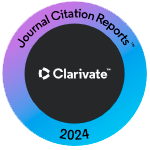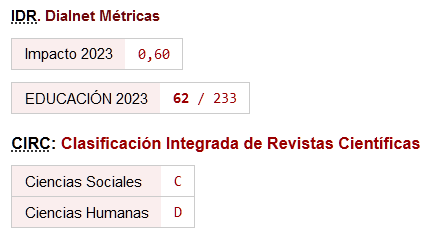Mindfulness (MBI) en la formación continua y evaluación de la transferencia en la empresa pública
DOI:
https://doi.org/10.46661/ijeri.7396Palabras clave:
Mindfulness, formación continua, transferencia al puesto de trabajoResumen
En este artículo de investigación, se presentan los resultados de transferencia al puesto de trabajo de la formación Mindfulness: Cultivando la atención plena, recibida por parte personas trabajadoras de la Diputación de Sevilla. La acción formativa es recibida como formación continua dentro de los planes de formación continua de la Diputación de Sevilla.
Concretamente la acción formativa presencial, es una Intervención Basada en el Mindfulness (MBI): Mindfulness: cultivando la atención plena, con una duración de 28 horas.
De esta intervención MBI se han analizado varios parámetros, uno de ellos la transferencia de los conocimientos adquiridos a la práctica profesional y personal.
Los datos analizados desprenden resultados positivos en todas las personas participantes, por lo que se puede afirmar que la formación en mindfulness supone una mejora en capacidades como la paciencia, resiliencia, comunicación, resolución de problemas, reducción del estrés, entre otras cuestiones a destacar en el clima empresarial y en la salud mental de las personas que la componen.
Descargas
Citas
Adecco. (2018). Mindfulness. https://adecco.cl/mindfulness/
Adecco. (2020). Beneficios del mindfulness en el trabajo https://www.adeccoinstitute.es/articulos/beneficios-del-mindfulness-en-el-lugar-de-trabajo/
Adeco (2016). Practicar el mindfulness aumenta un 20% nuestra productividad, https://www.adeccorientaempleo.com/mindfulness-aumentar-productividad/
Altman, D. (2019). 50 técnicas de Mindfulness para la ansiedad, la depresión, el estrés y el dolor. Libros Sirio.
Ballesteros Herencia, C. A. (2018). El índice de engagement en redes sociales, una medición emergente en la Comunicación académica y organizacional. Revista Razón y Palabra, 22(3-102), 96-124. https://dialnet.unirioja.es/servlet/articulo?codigo=6787048&orden=0&info=link
Chiesa A, y Serretti A. (2009). Mindfulness-based stress reduction for stress management in healthy people: a review and meta-analysis. Journal of Alternative and Complementary Medicine 15(5),593-600. https://doi.org/10.1089/acm.2008.0495
de la Cuesta, M. (2004). El porqué de la responsabilidad social corporativa. Boletín ICE Económico, 2813, 45-58. http://www.revistasice.com/index.php/BICE/article/view/3598/3598
Diputación de Sevilla (2019). Manual de Formación Plan Agrupado de Formación Continua. Diputación de Sevilla. https://bit.ly/2X3w3Xh
Farb, N. A. S., Anderson, A. K., Mayberg, H., Bean, J., McKeon, D. y Segal, Z. V. (2010). Minding one’s emotions: Mindfulness training alters the neural expression ofsadness. Emotion, 10, 25–33. http://dx.doi.org/10.1037/a0017151
García del Junco, J., Palacios Florencio, B. y Espasandín Bustelo, F. (2018). Manual Práctico de responsabilidad social corporativa. Gestión, diagnóstico e impacto en la empresa. Editorial Pirámide. https://www.tagusbooks.com/leer?isbn=9788436840063&li=1
García-Campayo, J. y Demarzo, M. (2018). ¿Qué sabemos del Mindfulness? Kairós.
Garrote-Caparros, E., Bellosta-Batalla, M., Moya-Albiol, L., & Cebolla, A. (2021). Effectiveness of mindfulness-based interventions on psychotherapy processes: A systematic review. Clinical Psychology & Psychotherapy, 29(3), 783-798. https://doi.org/10.1002/cpp.2676
Germer, C. K. (2011). El poder del mindfulness: libérate de los pensamientos y las emociones autodestructivas. Paidós.
Germer, C. K. y Neff, K. D. (2019). Mindful Self-Compassion (MSC). En I. Itvzan (Ed.) The handbook of mindfulness-based programs: Every established intervention, from medicine to education (357-367). Routledge. https://doi.org/10.4324/9781315265438-28
Glomb, T.M., Duffy, M.K., Bono, J.E. and Yang, T. (2011). Mindfulness at Work. En Joshi, A., Liao, H. y Martocchio, J.J. (Ed.), Research in Personnel and Human Resources Management. 30 (pp. 115-157). Emerald Group Publishing Limited. https://doi.org/10.1108/S0742-7301(2011)0000030005
De Zárate, A. G. O., García, M. A. A., & Berrocal, F. B. (2017). Evaluación de la eficacia de la formación en la administración pública: la transferencia al puesto de trabajo. INAP.
Hanh, T. N. (2020). Being peace. Parallax Press.
Hernández -Sampieri, R., Fernández-Collado, C., y Baptista-Lucio, P. (2014). Metodología de la investigación (6a. ed.). McGraw-Hill.
Hervás, G., Cebolla, A., Soler, J. (2016), Intervenciones psicológicas basadas en mindfulness y sus beneficios: estado actual de la cuestión. Clínica y Salud, 27, 3, 115-124. https://doi.org/10.1016/j.clysa.2016.09.002
Hyland, T. (2015). On the contemporary applications of mindfulness: Some implications for education. Journal of philosophy of education, 49(2), 170-186. https://doi.org/10.1111/1467-9752.12135
Kabat-Zinn J. (1982). An outpatient program in behavioral medicine for chronic pain patients based on the practice of mindfulness meditation: theoretical considerations and preliminary results. General hospital psychiatry, 4(1), 33–47. https://doi.org/10.1016/0163-8343(82)90026-3
Kabat-Zinn, J. (1990). Vivir con plenitud las crisis. Editorial Kairós
Karlin, D.S. (2018). Mindfulness in the workplace. Strategic HR Review, 17(2), 76-80. https://doi.org/10.1108/SHR-11-2017-0077
López-Martínez, L. F. L. (2021). Eficacia de un programa Mindfulness (Mindfulness Based Stress Reduction) en psicoterapeutas: una propuesta 2.0. Norte de Salud Mental, 17(65), 11-24. https://dialnet.unirioja.es/servlet/articulo?codigo=8047260
Lyddy, C. J., Good, D. J., Bolino, M. C., Thompson, P. S., & Stephens, J. P. (2021). The costs of mindfulness at work: The moderating role of mindfulness in surface acting, self-control depletion, and performance outcomes. Journal of Applied Psychology 106(12). https://doi.org/10.1037/apl0000863
Marina, J. A. (2006). Anatomía del miedo. Un tratado sobre la valentía. Anagrama.
Navarro García, F. (2008). Responsabilidad Social Corporativa. Teoría y Práctica. ESIC Editorial.
Neff, K.D. y Germer, C.K. (2013), A Pilot Study and Randomized Controlled Trial of the Mindful Self-Compassion Program. Journal of Clinical Psychology, 69, 28-44. https://doi.org/10.1002/jclp.21923
Pineda‐Herrero, P., Belvis, E., Moreno, V., Duran‐Bellonch, M. M., & Úcar, X. (2011). Evaluation of training effectiveness in the Spanish health sector. Journal of Workplace Learning. https://doi.org/10.1108/13665621111141911
Pineda-Herrero, P., Cirasco Calí, A., & Quesada-Pallarés, C. (2014). ¿Cómo saber si la formación genera resultados? El modelo FET de evaluación de la transferencia. Capital Humano, 292, 74-80.
Pineda-Herrero, P., Quesada, C., & Moreno, M. V. (2010). The ETF, a new tool for Evaluating Training Transfer in Spain. In 11th International Conference on Human Resource Development: Human Resource Development in the Era of Global Mobility.
https://grupsderecerca.uab.cat/efi/en/content/etf-new-tool-evaluating-training-transfer-spain
Pineda-Herrero, P., Quesada, C., & Stoian, A. (2011). Evaluating the efficacy of e-learning in Spain: a diagnosis of learning transfer factors affecting e-learning. Procedia-Social and Behavioral Sciences, 30, 2199-2203. http://hdl.handle.net/11162/79202.
https://doi.org/10.1016/j.sbspro.2011.10.428
Pineda-Herrero, P., Quesada-Pallarès, C., Ciraso Calí, A. (2020). Factores para la Evaluación indirecta de la Transferencia – FET. Universitat Autònoma de Barcelona.
Pineda-Herrero, P., y Quesada-Pallarès, C. (2013). Evaluación de la transferencia de la formación continua mediante el modelo ETF de factores. Revista Iberoamericana de educación, 61 (1), 1-5. https://doi.org/10.35362/rie6111273
Quesada, C., Pineda-Herrero, P., & Espona, B. (2011). Evaluating the efficiency of leadership training programmes in Spain. Procedia-Social and Behavioral Sciences, 30, 2194-2198. https://doi.org/10.1016/j.sbspro.2011.10.427
Rosenberg, M. (2016). Comunicación No Violenta. Un lenguaje de vida. 3ªedición renovada y ampliada. Editorial Acanto.
Sainz Martínez, P. (2017). Mindfulness en la empresa: el liderazgo mindful como transformación personal, empresarial y global. Zenith.
Segal Z. V., Williams J. M. G., y Teasdale J. D. (2002). Mindfulness-based cognitive therapy for depression: A new approach to preventing relapse. Guilford.
Segal, Z. V., Williams, J.M.G. y Teasdale, J. D. (2006). Terapia cognitiva de la depresión basada en la atención plena: Un nuevo abordaje para la prevención de recaídas.: Desclée De Brouwer.
Sesha (2019). Educación para una atención eficiente. La naturaleza de la atención. Asociación filosófica Vedanta Advaíta Sesha.
Shapiro, S.L. y Carlson. L.E. (2014). Arte y ciencia de mindfulness. Desclée de Brouwer.
Simón, V. (2011). Aprender a practicar Mindfulness. Sello Editorial.
Steyn T. (2013). Professional and organisational socialisation during leadership succession of a school principal: a narrative inquiry using visual ethnography SA. Journal of Education, 33, (2), 1-17. http://www.scielo.org.za/scielo.php?script=sci_arttext&pid=S0256-01002013000200010&lng=en&nrm=is
https://doi.org/10.15700/saje.v33n2a702
The mindfulness iniciative (2018). Building the case for Mindfulness in the Workplace. Mindfulness Initiative.
Tomás-Folch, M. y Durán-Bellonch, M. (2017). Comprendiendo los factores que afectan la transferencia de la formación permanente del profesorado. Propuestas de mejora. Revista Electrónica Interuniversitaria de Formación del Profesorado, 20(1), 145-157. https://doi.org/10.6018/reifop/20.1.240591
Torres-Martínez, N. E., Garza-Navarro, M. A., Lucio-Porto, R., García-Gutiérrez, D., Torres-Castro, A., & González-González, V. A. (2013). One-pot synthesis of magnetic hybrid materials based on ovoid-like carboxymethyl-cellulose/cetyltrimethylammonium-bromide templates. Materials Chemistry and Physics, 141(2-3), 735-743. https://doi.org/10.1016/j.matchemphys.2013.06.001
Umar, S., & Chunwe, G. N. (2019). Advancing environmental productivity: Organizational mindfulness and strategies. Business Strategy and the Environment, 28(3), 447-456. https://doi.org/10.1002/bse.2220
Villalba, D. (2019). Atención plena. Mindfulness basado en la tradición budista: Teoría y práctica (Sabiduría perenne). Editorial Kairós.
Descargas
Publicado
Cómo citar
Número
Sección
Licencia
Derechos de autor 2023 Laura Molina-García, César Bernal Bravo, Antonio Hilario Martín Padilla

Esta obra está bajo una licencia internacional Creative Commons Atribución-NoComercial-SinDerivadas 4.0.











